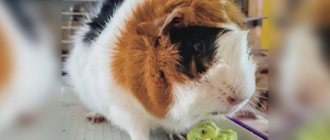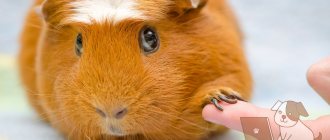Indications
Castration of rats can be carried out to treat or prevent diseases of the reproductive system, correct the behavior of sexually mature animals and prevent the appearance of unwanted offspring.
Medical indications
One of the main reasons for removing reproductive organs in rats is for medical reasons. This is due to the fact that rats are susceptible to cancer. Among the diseases diagnosed in adulthood, the most common neoplasms in females are neoplasms of the mammary glands (MGN), uterus and ovaries, and in males - malignant tumors of the testes.
Increased susceptibility to diseases of the reproductive system is one of the arguments for using castration of rats as the most effective way to prevent oncology. Performing the operation at a young age will allow the rat to recover much faster and minimize the likelihood of developing many dangerous pathologies of the reproductive organs in the future. Neutering female rats significantly reduces the risk of developing pituitary tumors.
Clear indications for the procedure are diagnosing diseases in rats that can only be treated by surgical removal of the testes and appendages (with or without the uterus).
Hyperaggression of males
Rats tend to form family or territorial groups, so keeping solitary animals is considered unnatural for these rodents. The coexistence of several animals is associated with problems of a different kind: after puberty, conflicts arise between same-sex rats (mainly males), which often result in serious injuries. Often in sexually mature males, hyperaggression also occurs towards the owner.
Castration of rats makes it possible to correct their behavior. Castrated males can coexist quite peacefully in the same cage.
Keeping different-sex individuals
When listing the main reasons for castration of rats, we should specifically focus on the high fertility of these rodents. Pregnancy in a rat lasts only three weeks, and each litter can have from 5 to 20 cubs (depending on the species). Almost immediately after giving birth, the female is ready for mating again. Unlike their outdoor relatives, ornamental rodents are ready to reproduce throughout the year.
Uncontrolled reproduction has an adverse effect on the condition of the rat: frequent childbirth depletes its body, significantly shortening its lifespan. Another problem arises related to the need to accommodate numerous offspring.
If you plan to keep rats of different sexes, the best solution would be to pre-castrate the males or sterilize the females. Castrated males can be kept together with females without the risk of having numerous offspring.
Character of a rat after castration
- A neutered pet does not lose activity and curiosity.
- If the rat was not fat before castration, it will not gain weight.
- The animal will guard the territory as before. Therefore, you need to add relatives according to the usual rules.
- Animals of different sexes are sociable and mate as before, but there will be no offspring.
- Under severe stress, castrated males sometimes begin to mark their territory.
- Operated pets are practically no different from full-fledged animals, but keeping them at home is much easier.
Contraindications
Castration of rats is associated with certain risks for the animal. It is not recommended to perform the procedure on individuals older than 1 year, since the body’s response to anesthesia worsens with age. Limitations include some comorbidities. A ratologist, a veterinary specialist who treats rodents, will help eliminate possible contraindications. You can make a decision to castrate a rat after a preliminary examination by a specialist.
An operation in the presence of contraindications is possible when the obvious risks from the identified disease exceed the risk of possible complications during the intervention.
Optimal age
There is no consensus regarding the timing of castration. Most veterinarians believe that the optimal age for a rat is 3 to 4 months. By this point, all organs of the genitourinary system have already been formed, and the growth and development of the rodent has stopped. At the same time, at this age the rat is still young enough to tolerate anesthesia and surgery well, and also to recover quickly in the postoperative period.
Some experts believe that it is possible to operate on a rat almost immediately after puberty, which usually occurs by 40-50 days of life. A specialist will help you correctly determine the recommended age for castration of a particular individual after examining the rodent.
Points for and against
There are constant discussions around the issue of castration of rats between opponents of the operation and those who consider its implementation necessary and justified. The main argument against sterilization is the rat's short lifespan. Many people believe that an animal that will live only 2-3 years should not be subjected to a rather dangerous operation. In addition, uncontrolled behavior and the appearance of strong-smelling discharge at certain periods are not so pronounced in rats, which reduces the motivation for surgical intervention. Another reason for disapproving of castration of rodents is that they do not tolerate the effects of painkillers. In some cases, animals do not recover from general anesthesia after the procedure is completed. This problem has recently become less acute due to the advent of safer inhalation anesthesia.
Intervention is advocated by many veterinarians, breeders and nursery owners who are constantly faced with the need to treat adult animals for various pathologies. Castration is especially important for females, in whom the production of sex hormones very often causes pituitary tumors and rapidly growing neoplasms of the mammary glands. Neutering rats is also the most effective way to control your pet's reproduction.
Before making a decision, it is necessary not only to weigh all the arguments for and against, but also to evaluate the conditions in which the rat will live: whether it will be kept alone or in a group, with individuals of what sex it will be in the same cage, etc.
pros
The positive consequences of castrating a rat include reducing the risk of developing dangerous pathologies and increasing its life expectancy. After the procedure, it is possible for both same-sex and opposite-sex individuals to live together without negative consequences.
Minuses
Removal of the reproductive organs does not have the same effect on the rat as on other animals. Many owners are interested in the question: does castration lead to obesity, and will the pet become less active? Removing the testes or ovaries will not cause weight gain or cause drastic changes in behavior other than eliminating episodes of aggression.
The disadvantages of castration are the anesthetic risk and the cost of the intervention, comparable to performing the same manipulations on a cat or dog.
Why is surgery needed?
Castration and sterilization are the main method of preventing unwanted reproduction of domestic animals. Essentially, this is a surgical procedure during which the reproductive organs of the animal being operated on are removed.
In addition to protecting against uncontrolled reproduction, the operation corrects the behavior of rats (makes aggressive and hot-tempered individuals calmer), and also prevents the occurrence of serious diseases of various types in the animals. However, often the removal of reproductive organs is used not only for preventive purposes, but also during the treatment of already formed diseases that mainly affect the reproductive system.
Complexity of the operation
The technique for removing testes or appendages in a rat is similar to performing the same procedure on other animals. The differences relate to certain surgical nuances: the doctor must know the characteristics of the rodent body and have experience in performing operations with small surgical access and the need to suture thin tissues of internal organs.
The difficulty of castration also lies in the fact that due to the small weight of rats, it is difficult to select the dose of anesthesia, and many drugs intended for intravenous administration are not recommended for use at all.
Pros of castration
- Easier to maintain. Castrated males are much calmer and do not bite their relatives. Nulliparous females get sick less, so their life expectancy is longer.
- You don’t have to worry about an unplanned pregnancy or the problem of settling unwanted rat pups.
- You can easily put opposite-sex and same-sex animals in the same cage; they will not compete and cause injury to their relatives. There will be no unwanted babies, although the animals will be able to breed.
- The appearance of animals will improve due to the normalization of the function of the sebaceous glands.
- Males will not mark the home, and the nasty smell will disappear.
Anesthesia
Castration of rats is almost always carried out under general anesthesia. The use of local anesthesia is recommended only in cases where general anesthesia is contraindicated due to the health of the rat. Care after surgery largely depends on the type of anesthesia.
Injectable
This method involves intramuscular administration of the drug. The injection method is considered the most dangerous for two reasons:
- due to the impossibility of monitoring the animal’s condition and adjusting the depth of anesthesia after administration of the drug;
- due to the high toxicity of most painkillers.
At the same time, there is an opinion that intramuscular anesthesia, which lasts for several hours after surgery, reduces the pain of the rat and alleviates its postoperative condition.
Inhalation anesthesia
The supply of anesthetic in the form of gas through a mask makes it possible to minimize all possible risks and negative consequences of anesthesia. The amount of the drug entering the lungs can be controlled, and there is no negative effect on the liver and other internal organs.
Inhalation anesthesia is a more expensive method of pain relief, as it requires special equipment and expensive drugs.
To the tail vein
During the operation, anesthesia can also be given to the rat through the tail vein. This method is the most optimal in terms of cost and safety for the animal.
Postoperative period
The doctor who will castrate the rat will tell you in detail about how long the rehabilitation period lasts and how to care for a castrated rodent. Typically, care after castration includes monitoring the animal's condition and proper feeding.
Recovery from anesthesia
The greatest attention after the end of the procedure requires the animal to recover from anesthesia. If necessary, the rat should be placed on a heating pad and covered to maintain body temperature. The animal should be placed on its side to prevent the tongue from sinking. The litter must be clean and must be changed as soon as it gets dirty.
How long it takes for a rat to recover from anesthesia depends on the type of anesthesia and the state of the body. After inhalation anesthesia, the rodent comes to its senses within 10-20 minutes. When using injection anesthesia, recovery from anesthesia may take several hours. During this period, it is necessary to ensure constant supervision of the pet.
Feeding
You can feed the rat immediately after regaining coordination of movements. On the first day, it is necessary to limit the amount of food to ½ the daily ration. In the absence of complications, nutrition in the following days is carried out as usual.
For 2-3 days, you should constantly keep an eye on the rat: inspect the sutures, monitor appetite, diuresis and defecation.
Advantages of castration at home
In a modern city, veterinarians operate in clinics and at home. Castration for an experienced surgeon is an elementary procedure; it is successfully performed at home.
For owners and their pets, castration at home is more convenient due to a number of advantages.
- The pet is at home, in peace and comfort. The owner is nearby and will support the pet.
- The animal will not have to be taken to the hospital and back, subjecting it to psychological and physical tests.
- Choose a convenient time, including nights and weekends. The doctor will arrive at the agreed time.
- There is no risk to have surgery at home. The veterinarian will tell you in advance how to prepare the rat and how to care for it after the procedure.
- The price of the service does not differ from a similar procedure in the clinic.
- If complications occur, a doctor will definitely arrive to provide assistance. You can also get advice over the phone.
The veterinarian, when going on call, will take with him the necessary instruments and medications.
The operation lasts no longer than half an hour, and often half as long. After the veterinarian leaves, the owner needs to stay with the pet for several hours until he wakes up from the anesthesia.
After waking up, the patient must be carefully given water, warmed and calmed.
General services
| Prices for services in our clinic | In the clinic and at home |
| Ratologist visiting your home | from 500 |
| Clinical examination, preliminary diagnosis, consultation | from 500 |
| Telephone consultation | for free |
| Therapy | from 150 |
| Surgery | from 150 |
| Ambulance at home (within an hour) | from 1000 |
Therapy
| Prices for services in our clinic | In the clinic and at home |
| Subcutaneous administration of drugs to rodents | from 150 |
| Intramuscular administration of drugs to rodents | from 200 |
| Intravenous (into a catheter, through a needle) | from 200 |
| Dropper for rodents | from 1000 |
| Placement of an intravenous catheter | from 300 |
| Removing the IV catheter | 200 |
| Tube feeding of rodents | from 300 |
| Taking blood samples | from 300 |
| Novocaine blockade | from 200 |
| Reduction of the cheek pouch | from 200 |
| A haircut | |
| Nail trimming | from 300 |
| Haircutting mats | from 1000 |
| Ear treatment | from 300 |
Surgery and Traumatology
| Prices for services in our clinic | In the clinic and at home |
| Surgery | |
| Surgery of the genitourinary organs in rodents: | |
| Castration | from 2000 |
| Sterilization | from 2500 |
| Surgical procedures | from 400 |
| Surgical treatment of wounds | from 300 |
| Application of musculocutaneous sutures | from 200 |
| Applying a bandage | from 100 |
| Applying a plaster cast | from 1000 |
| Removing the plaster cast | from 300 |
| Surgery for skin, soft tissue and tumor infections | |
| Opening abscesses, hematomas | from 400 |
| Treatment of purulent wounds | from 700 |
| Drainage installation | from 500 |
| Flushing the drainage | 350 |
| Treatment of auricular hematoma | from 1500 |
| Unilateral mastectomy | from 4000 |
| Regional mastectomy | from 5000 |
| Removal of tumors | from 2000 |
| Abdominal surgery | |
| Obstetrics in rodents | from 1000 |
| Animation of newborns | from 300 |
| C-section | from 3000 |
| Pyometra | from 1500 |
Anesthesiology for rodents
| Prices for services in our clinic | In the clinic and at home |
| Anesthesia | from 500 |
Ophthalmology
| Prices for services in our clinic | In the clinic and at home |
| Eyelid surgery for inversion, eversion | from 2000 |
| Exenteration of the eyeball | from 3000 |
Dentistry
| Prices for services in our clinic | In the clinic and at home |
| Removal of incisors | from 500 |
| Trimming and correction of teeth in rodents | from 1500 |
Laboratory diagnostics
| Prices for services in our clinic | In the clinic and at home |
| Blood analysis: | |
| General clinical blood test | 900 |
| Blood cytology | 1000 |
| Biochemical analysis for 1 sample indicator | 300 |
| Biochemical blood test for 6 indicators | 1500 |
| Biochemical blood test for 12 indicators | 2500 |
| Additional biochemical indicators for pancreatic amylase, rheumatoid factor, c-reactive protein | from 300 |
| Analysis of urine: | |
| General clinical urine analysis | 400 |
| Express urine glucose test | 200 |
| Express urine test | 300 |
| Biochemistry of urine 1 indicator | 100 |
| Stool examinations | |
| General stool analysis | 500 |
| Stool culture for pathogens | 1500 |
| Stool analysis for dysbacteriosis | 2000 |
| Stool analysis for protozoa and helminth eggs | 500 |
| Bacteriology | |
| Bacteriological screening | 2000 |
| Microbiological screening | 2000 |
| Full microbiological screening (no subtitration) | 1500 |
| Skin studies | |
| Skin biopsy | 1700 |
| Skin smear | 1000 |
| Dermatophytes and ectoparasites | 1000 |
| Pathomorphology | 1500 |
| Histology of neoplasms, cystic contents | 2000 |
| Cytology of neoplasms, cystic contents | 1500 |
Complications
Castration of rats is associated with the risk of developing surgical and postoperative complications. Incorrect calculation of the dose of anesthetic can cause death or disruption of the functioning of internal organs, primarily the kidneys.
Complications after castration of rats can be caused by wound infection or self-removal of sutures. The penetration of infection is indicated by redness and swelling of the skin around the incision, and the appearance of purulent discharge. In case of any deviations from the normal state, it is necessary to show the rat to a veterinarian as soon as possible.










